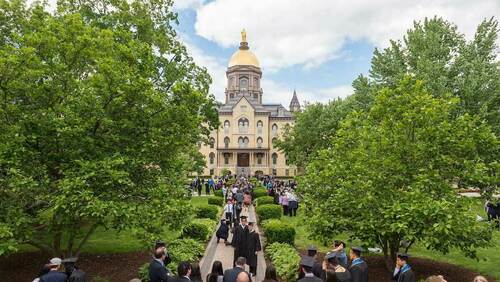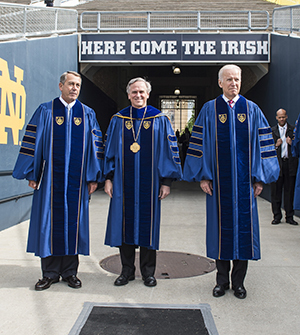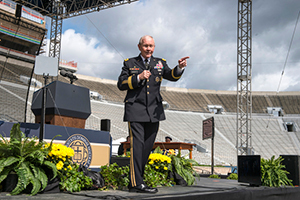
 President Rev. John Jenkins, C.S.C., is flanked by Laetare Medal recipients John Boehner and Vice President Joe Biden
President Rev. John Jenkins, C.S.C., is flanked by Laetare Medal recipients John Boehner and Vice President Joe Biden
The families, friends and graduates of the University of Notre Dame’s Class of 2016 in Notre Dame Stadium Sunday morning (May 15) braved unseasonably chilly weather to celebrate the University’s 171st Commencement Ceremony.
Before degrees were conferred on 2,163 Notre Dame undergraduates, Rev. John I. Jenkins, C.S.C., the University’s president, introduced Vice President Joseph Biden and former Speaker of the House John Boehner, the recipients of the 2016 Laetare Medal, Notre Dame’s highest honor.
Father Jenkins acknowledged that both political leaders “have cast votes and taken positions about which many among us have reservations, in some cases grave moral reservations. We cannot and do not turn a blind eye to such reservations. We award you today the Laetare Medal not to endorse particular positions you have taken or votes you have cast, but because each of you has given his life to serve the common good in political leadership by your own best lights.
“Despite a fractious political environment,” Father Jenkins said, “you have each built collegial relationships with those with whom you disagree, even disagree vehemently. In careers marked by patriotism, perseverance, hard work, courage, and sometimes tragedy, you have each found strength and guidance in your faith.”
In the first acceptance address, Boehner spoke of his affection for two former Notre Dame football coaches from his native Ohio, Gerry Faust, who had been Boehner’s coach when he played football at Moeller High School in Cincinnati, and his friend Lou Holtz. He also spoke of his friendship with his political opponent Biden. “Governing is the art of the possible. Politicians are constantly being pushed to promise the impossible,” Boehner said, "but governing isn’t about promising the impossible. Governing, in its essence, is the art of the possible. Governing requires us to look for common ground where it can be found — without compromising on our principles.
“As Speaker, I always drew a distinction between ‘compromise’ and ‘common ground,’” Boehner said, “because I truly believe they are two different things, and the fact of the matter is, you can find common ground with people on the other side without compromising on your core beliefs. Ladies and gentlemen, Vice President Joe Biden is one of those people.”
Biden, pronouncing the Laetare Medal “the most meaningful award I have ever received in my life,” offered wide-ranging reflections on faith in public life. He remembered being impressed by the ingenuous greeting of Pope Francis when he met him on a diplomatic visit to Rome. “‘You always welcome here,’ Pope Francis said. That is the message he’s sent to the world and the reason why he’s most respected man in the world, not just among Catholics, but among Muslims, Hindus, other Christians and the Jewish community. ‘You are always welcome here’ is the message he was urging upon Congress and all of us who hold high office, to extend our hands as Americans and say, ‘You are always welcome here.’”
Biden also spoke of the faith learned and nurtured in his family. He spoke of the importance of faith when “reality intrudes” on distracted ambition, remembering the personal tragedies of his own life. He spoke emotionally of the recent death his son, “my soul, my Beau,” who died last January of cancer, and expressed thanks to God that faith had sustained and strengthened their love for each other. Recalling that some people have described his mutually respectful and affectionate relationship with Boehner as “old school,” Biden said, “John and I aren’t ‘old school,’ we’re the American school.” He closed by entreating the Class of 2016 to “engage in the tireless pursuit of finding common ground, because not only will you be happier, you will be incredibly more successful. That’s where you will find your reward, and you’ll leave us all the better for it.”
The Laetare Medal presentations were followed by the conferral of honorary degrees on Gen. Martin E. Dempsey, former chairman of the Joint Chiefs of Staff, and five others: molecular microbiologist Rita Colwell; civil rights movement leader Diane Nash; outgoing University Board of Trustees chairman Richard Notebaert; internationally acclaimed jazz and classical musician and composer Arturo Sandoval; and Pauline Yu, president of the American Council of Learned Societies. A sixth honoree, Cardinal Donald Wuerl, archbishop of Washington, D.C., received an honorary degree Saturday evening while serving as the presiding celebrant of Notre Dame’s 2016 Baccalaureate Mass.
 Gen. Martin Dempsey delivers the 2016 Commencement Address
Gen. Martin Dempsey delivers the 2016 Commencement Address
Dempsey, introduced by Father Jenkins as a personal friend who “embodies what it means to be a leader of consequence,” gave the commencement address, first warming up — literally — the shivering students with “Graduation Karaoke,” a jovial and impromptu exchange of group singing. His address soon grew more serious, turning to a reflection on the familiar Notre Dame slogan, “God, Country, Notre Dame.”
Praising the “faith-based education that has taught you and will remind you, if you allow it to, that it is not just what you accomplish in life, but how you accomplish it,” Dempsey reminded the graduates that “your faith, like your education, doesn’t end today. Your faith, like your education, cannot survive if dormant.”
Dempsey said that with commencement the graduates have become “part owners of the greatest nation on the face of the earth.” America, he said “is the world’s engine, but also its conscience.” He said that “for you to lead this country, we don’t just need you to succeed; we need you to inspire … We need you to have a warrior’s heart, an immigrant’s spirit, and a servant’s soul.”
The Class of 2016, Dempsey said, leaves “Our Lady’s University with everything you need to be leaders of consequence wherever life takes you … I challenge you to make each other proud in the future as you have in the past.”
The daunting temperatures seemed to make all the more appropriate the remarks of 2016 valedictorian Abby Davis, a political science major from Avon Lake, Ohio, whose address preceded Dempsey’s. Davis listed first among “three key lessons” the new Notre Dame graduates would take with them that “we have learned to be more comfortable with being uncomfortable.” The moments of discomfort, she said “are often the moments of greatest opportunity. And, somewhere along the way, as we stretched our comfort zones and pushed our limits.” She said the Class of 2016 had also learned “what we believe in and what we are willing to fight for,” by answering the call of Rev. Theodore M. Hesburgh, C.S.C., “to be the kind of person who not only understands the injustices of this life, but is also willing to do something about them.” Finally, Davis said, “we have learned to take care of ourselves and to pick ourselves up when we fall,” adding that the diplomas of her classmates “are a promise to our families, our friends, our professors and ourselves that we will use what we have learned here to do great things and to pay back, many times over, all that has been invested in our education and growth. I know that we will follow through on this promise. We will embrace the uncomfortable, we will fight for what we believe in and value, we will take care of ourselves and persevere through whatever challenges come our way.”
During the ceremony, in addition to receiving an honorary degree, Notebaert became the first recipient of the Hesburgh-Stephan Medal, named in honor of the late Rev. Theodore M. Hesburgh, C.S.C., Notre Dame’s 15th president, under whose leadership the Board was established, and Edmund A. Stephan, first chairman of the Board. The medal recognizes a Trustee, whether lay or a member of the Congregation of Holy Cross, for uncommon and exemplary contributions to the governance and mission of Notre Dame during his or her tenure on the Board.